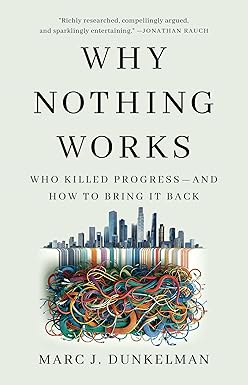
Pity the author, Marc J. Dunkelman! This book, dealing as it does with the perceived difficulty of implementing grand government-driven schemes lumped under the broad category of "progress", seems to cover very similar ground as does another book: Abundance by Ezra Klein and Derek Thompson. And Abundance seems to be getting a lot more attention.
For example, I could easily find Dunkelman's book at Portsmouth (NH) Public Library; in contrast, PPL owns three copies of Abundance, and they are all checked out (as I type).
Dunkleman's thesis is pretty simple. He adapts the terminology of the early 20th century Progressive, Herbert Croly, who was famous for his advocacy of using "Hamiltonian means to achieve Jeffersonian ends". (Croly was also one of the leading examples/villains of Jonah Goldberg's classic title Liberal Fascism, but we won't get into that.) Dunkleman is not as hostile toward Jefferson as Croly was, though. His approach is that your standard Progressive harbors both (a) a "Hamiltonian" yen to accomplish Big Projects under the direction of wise and benvolent central planners and bureaucrats; and (b) a "Jeffersonian" impulse that central authorities have too much unchecked power to run roughshod over individuals and communities that don't have as much political pull. Currently, he believes, the Jeffersonian ideal holds sway; it's why we can't have nice things, like high-speed rail, "affordable" housing, and hydro power from Quebec down here in New England.
Dunkleman is a Progressive, and is mostly aiming his argument at other Progressives. He views one Hamiltonian/Jeffersonian oscillation as "the yin turned to yang, the ebb turned to flow, and the teeter-totter crossed its fulcrum." The idea that there might be some fundamental, and essentially insoluble, problems with Progressive central planning is not seriously considered. Friedrich Hayek's The Road to Serfdom is briefly mentioned along the way, but only as a sign of increasing skepticism of the Progressive project. I kept looking for other serious criticisms: mentions of public choice theory, for example, but if they were there, I missed them. To his credit, Dunkleman does seem to recognize the problem of regulatory capture, especially when he looks at passenger airline deregulation. (Which happened largely thanks to … Progressive Ted Kennedy!)
As noted, one of Dunkleman's examples is a local one: he goes into great detail on the Northern Pass project, meant to string high-voltage power lines down through northern New Hampshire, down to Concord, Deerfield, and (eventually) Massachusetts.
The book is full of tales like that; I confess I found many of them not as interesting. Dunkleman keeps hammering them into his Hamiltonian/Jeffersonian thesis, though, to a somewhat tiresome extent. That gets repetitious.
The book's subtitle promises that Dunkleman will reveal "how to bring [progress] back". This, he finally gets around to telling the reader, is kind of misleading. On page 330 of the 333-page text: "This book was written not to prescribe thee specific changes that should be made in every realm of public policy, but to argue for a shift in narrative." Sigh. Fine.
I'll keep looking for Abundance.
![[The Blogger]](/ps/images/barred.jpg)



